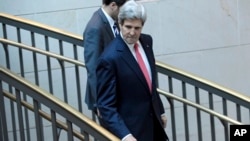CAPITOL HILL —
A direct appeal by U.S. Secretary of State John Kerry has not convinced skeptical senators to forgo a push to boost sanctions against Iran. Kerry appears to have changed few if any minds when he told U.S. lawmakers that further sanctions would torpedo delicate international negotiations to limit Tehran's nuclear program.
Secretary Kerry met with a large contingent of senators of both parties behind closed doors at the Capitol. Emerging an hour later, several lawmakers said they heard the same arguments against new sanctions that Kerry has been making in public in recent days.
Republican Senator John McCain was unimpressed.
“I was not only not persuaded, [but] many of the statements the secretary of state made as facts I know are factually false, because I just came back from the region," said McCain.
McCain did not elaborate, but he did predict a Senate bill will be unveiled soon to tighten sanctions against Iran in the event nuclear negotiations fail.
“I and many of my colleagues on both sides of the aisle are still committed, to passing legislation that would call for, at the expiration of six months if there is no final agreement, increased sanctions on Iran,' he said.
Echoing the call was fellow-Republican Senator Lindsey Graham.
“Giving the administration a six-month period to negotiate an acceptable deal makes sense to me, but having sanctions hanging over the head of the Iranians if the deal is not acceptable also makes sense to me," said Graham.
Iran has said that further sanctions would violate the interim nuclear agreement and scuttle talks.
Tuesday, the chairman of the Senate Banking Committee announced a hold on new sanctions, for now. But, after meeting with Secretary Kerry, the chairman of the Foreign Relations Committee, Robert Menendez, declined to comment on what might emerge from other quarters in the Senate. Menendez is one several Democrats who has argued that the threat of further sanctions would strengthen America’s hand in future negotiations with Tehran.
Not all lawmakers agree. Democrat Jay Rockefeller took to the Senate floor to urge restraint. The senator said sabotaging negotiations is foolhardy, given that the alternative to a negotiated settlement to Iran’s nuclear program is, in his words, “acts of war.”
“If Iran reneges or plays games, there is no question in anybody’s mind in the Senate that we will pass new sanctions the very moment that the need arises. But we do not have to do that now. In fact, it is a terrible mistake to do that now," said Rockefeller.
Even the most ardent backers of new sanctions admit that time is short to pass a measure before the end of the year. But Senator Graham expressed hope for expedited consideration of a bill that could come up for a vote, possibly in January. Even if Congress passed such a bill, it would face a near-certain veto by President Barack Obama.
Asked if the Senate is more or less likely to act after Secretary Kerry’s closed-door appeal, Democrat Chris Coons would only say, “It is in the hands of other members now”.
Secretary Kerry met with a large contingent of senators of both parties behind closed doors at the Capitol. Emerging an hour later, several lawmakers said they heard the same arguments against new sanctions that Kerry has been making in public in recent days.
Republican Senator John McCain was unimpressed.
“I was not only not persuaded, [but] many of the statements the secretary of state made as facts I know are factually false, because I just came back from the region," said McCain.
McCain did not elaborate, but he did predict a Senate bill will be unveiled soon to tighten sanctions against Iran in the event nuclear negotiations fail.
“I and many of my colleagues on both sides of the aisle are still committed, to passing legislation that would call for, at the expiration of six months if there is no final agreement, increased sanctions on Iran,' he said.
Echoing the call was fellow-Republican Senator Lindsey Graham.
“Giving the administration a six-month period to negotiate an acceptable deal makes sense to me, but having sanctions hanging over the head of the Iranians if the deal is not acceptable also makes sense to me," said Graham.
Iran has said that further sanctions would violate the interim nuclear agreement and scuttle talks.
Tuesday, the chairman of the Senate Banking Committee announced a hold on new sanctions, for now. But, after meeting with Secretary Kerry, the chairman of the Foreign Relations Committee, Robert Menendez, declined to comment on what might emerge from other quarters in the Senate. Menendez is one several Democrats who has argued that the threat of further sanctions would strengthen America’s hand in future negotiations with Tehran.
Not all lawmakers agree. Democrat Jay Rockefeller took to the Senate floor to urge restraint. The senator said sabotaging negotiations is foolhardy, given that the alternative to a negotiated settlement to Iran’s nuclear program is, in his words, “acts of war.”
“If Iran reneges or plays games, there is no question in anybody’s mind in the Senate that we will pass new sanctions the very moment that the need arises. But we do not have to do that now. In fact, it is a terrible mistake to do that now," said Rockefeller.
Even the most ardent backers of new sanctions admit that time is short to pass a measure before the end of the year. But Senator Graham expressed hope for expedited consideration of a bill that could come up for a vote, possibly in January. Even if Congress passed such a bill, it would face a near-certain veto by President Barack Obama.
Asked if the Senate is more or less likely to act after Secretary Kerry’s closed-door appeal, Democrat Chris Coons would only say, “It is in the hands of other members now”.




